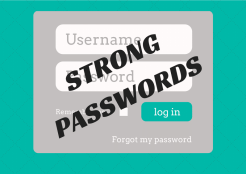 A strong password is the first line of defense for keeping people out of your information. If a person can not guess the password, then they can not get into your account. The more robots that are made to be key loggers and password guessers, the easier it is to guess a password and enter a site that the robot does not belong.
A strong password is the first line of defense for keeping people out of your information. If a person can not guess the password, then they can not get into your account. The more robots that are made to be key loggers and password guessers, the easier it is to guess a password and enter a site that the robot does not belong.
Strong passwords are at least eight characters with capital letters, lowercase letters, numbers, and special characters in them. A great one has a mix of all four characters and ten to twenty characters long. The less legible the better.
Password Best Practices
- Never ever never use “admin” or “user” for the username and “password” for the password. Never! Do not use pa55word or password123 either. Those are the first passwords to be cracked. Just do not even think of this as being an option. Ever.
- Capitalizing the first letter of a used word or name does not make it more secure either. JamesBrown is just as easy to crack as jamesbrown. Capital P is only important when spelling WordPress. It will not make your “Password” more secure. Again, the less legible the better.
- Do not use words. If it something that can be guessed easily, the hacker can guess it as well. Even the combining of words are easily guessable. Using “iloveyou” or “cheersfriends” is as easily hackable as using your name. Adding numbers or special characters that look like letters like making a password of “Jam$areJ3lly” will make it a bit less hackable but only a very little.
- Never use personal information as your password. Anyone’s name, birthdate, anniversary, dog’s name, address, etc. are never good ideas to use as passwords. If a friend or family member can guess it, the hackers can to.
- Use a different password for every login. If you have the same password for every account you log into, then if a hacker finds out your password to your email, then they can get into everything. This is important because if you use the same password and someone gets into your email, then they have access to everything. They can get into banking information, credit card login, and much more. Definitely keep a unique password for each and every financial institution and email accounts.
- Use a password keeper to store your passwords. Personally suggest LastPass, KeePass, or 1Password for Mac. You only need to remember the one to login for the application and they take care of remembering the rest. All have their own pros and cons. Try all three and see which one you like the best. With using a password keeper, you do not have to remember those passwords that are not words.
- Use a password generator to make up your passwords. Most of the password keepers have them built into them. You can specify length and what type of characters you want within the password. Once you chose the one you like, you can save them to the password keeper as well.
- One thing that is popular right now is “password therapy”. Password therapy is where you make a password that is more like a mantra that you repeat. For example, you want to quit smoking. You make your password for all of your logins “smoke free”. For security reasons, this is a bad idea! keep separate logins for everything.
- Do not email passwords. LastPass gives you an option to email a link to your password. Unless you have encryption set up, the email can be compromised.
- Do not share your passwords with anyone who does not have a direct need for them. Login information should always be a need to know thing. If you can set up the other person with a separate user credentials it is always better than giving them yours. Always take the minimalist approach and only give out what they need and as much access as they need.
These steps will help to keep your information more secure. Just remember, nothing is ever 100% secure but it always better to do something than to do nothing. Keep your information up to date and do not share it with anyone. There will always be new vulnerabilities coming out. Just remember the basic rules of passwords and that will help aid you to keep the bad guys out.







Great read! Password managers are constantly adapting. They are now starting to become the virtual wallets for consumers. @lockitsolution.